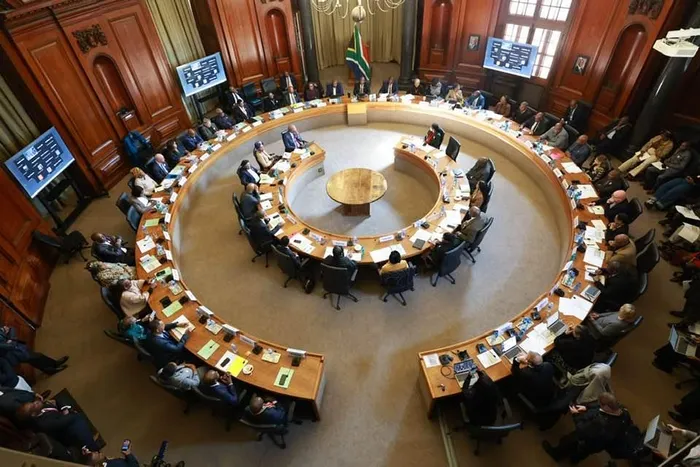
President Cyril Ramaphosa, supported by Deputy President Paul Mashatile and Cabinet Ministers convened the first inaugural meeting with members of the National Dialogue Eminent Persons Group at the Union Buildings in Pretoria on Friday.
Image: The Presidency
Siphamandla Zondi
PRESIDENT Cyril Ramaphosa has finally confirmed the start of the national dialogue in South Africa in mid-August.
He has explained that it will be a people-centred dialogue and in an open letter the former President Thabo Mbeki has called it a citizen-led exercise.
Both are noble ways of thinking about it but several realities will have to be tackled to realise these ideals. This opinion piece is inspired by initial discussions within the Devoted Citizen NGO preparing for this opportunity. Academics like myself who are committed to research through community engagement are duty-bound to assist drive active citizenship based on evidence.
First, it is important to note that the need for South Africans to engage about the current state of the country and what must be done to fix it, has long been talked about.
Civil society activists have decried the state of our country, the manner in which its economy functions, in particular the fact that it breeds more poverty than shared prosperity, the fact that its public infrastructure is in disarray, and social services including education and health are also falling apart.
Activists have said none of these crises are natural in any way but they result from leadership and governance failures. They know that therefore these problems can be reversed when collective will is used to say no further. We cannot allow our country to be run down, our cities to become infested with preventable problems and our villages and townships to become unliveable.
Activists have long pointed out that we need change in leadership, both in persons and in form. So, there must not just be new leaders but there must be new leaders with a renewed sense of purpose, leaders with a new attitude to their task, leaders with greater desire to leave a lasting social legacy. We need a new type of leading, one that includes all, one that organises the best of talent and skills we have to tackle mammoth problems.
Activists have said we have to rethink how we see ourselves. We cannot allow what we see around us to become the way of life.
We must reject the idea that when Africans take over, things fall into pieces, they say. These agents of change believe we have to believe that we can build a country of our dreams.
But we know exactly what dreams we have for this country. It is clear that such a dream must be repeated to leave behind a country far greater, far more excellent, far more functional, and far more prosperous than the one we inherit.
Activists have long said maybe we need a CODESA Two but one that is sharply focused on real outcomes. Some of those are to end the era of deadwood running at public institutions.
It must end the error of corruption. It must completely reject incompetence in any public office. It must reject nepotism that robs this country of the benefit of the best skills it already has.
It must reject narrow party political agendas and embarrass an inclusive forward-looking agenda. Parties have to transcend their narrow focus on what is in the interest of their party, their ideology or their constituencies only, and focus on what South Africa needs.
A citizen-led national dialogue should not be political party driven. We should therefore be concerned about the DA-ANC contests at the moment as they signal a fight for the control of the national conversation. Together they constitute only about 60% of the voting public which in itself is not a whole public. Political parties must be encouraged to focus on parliament where they are mandated to pursue positive change. They have not been that successful in doing it. They must let the dialogue take place on the basis of open persuasions and inputs from all who wish too.
Organisations like Citizens Coalition, Devoted Citizen NGO, Abahlali BaseMjondolo, etc must be encouraged to drive the process of garnering views that may be silenced by the nature of process and limited time available or even lack of information.
Faith-based NGOs such Devoted Citizen, Economic Justice Network, AFRODAD, People Matter Foundation, and so forth have a duty to serve, a responsibility to contribute to building a better country. Since they are driven by hope, they ought to translate that hope into reality working with others to build the country we want.
Civil society is a diverse body of people, divided by ideas and ideology, by constituencies and styles of engagement, attitude and passions. But it is the beauty of that diversity joined by a shared commitment to place the country’s destiny in the hands of citizens that make them the ideal participants in the national dialogue.
Civil society formations must in their individual and collective forms prepare ways of garnering views to represent at the National Dialogue.
Professor Zondi is a Volunteer Convenor at Devoted Citizen NGO.